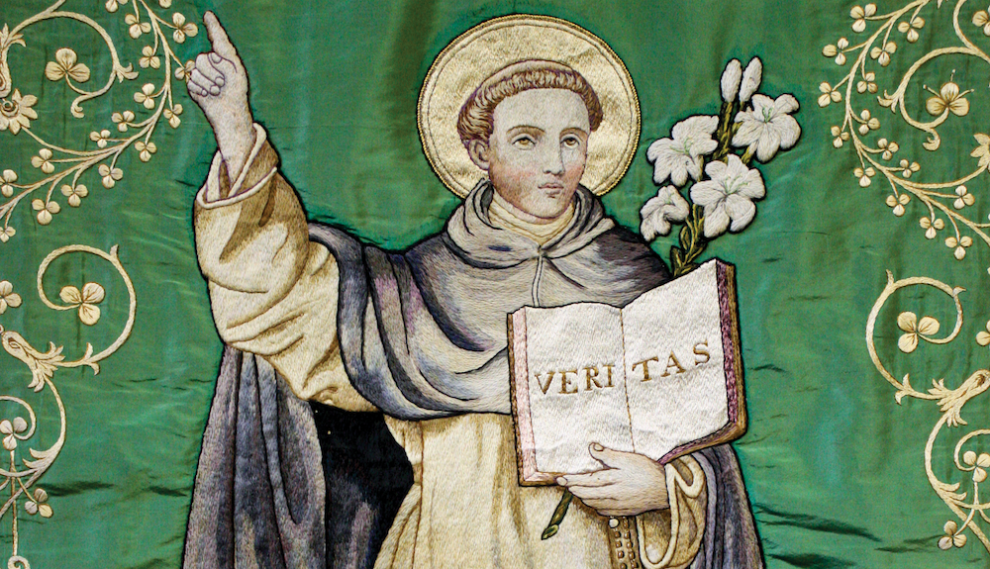
AN ORANGE TREE FOR ST. DOMINIC

On the feast of a saint like Dominic, the founder of all things Dominican, it can be difficult to see a model for our lives – legendary saints like this can stare at us more like an accusation than an inspiration. Look at all I did! I founded universities, orders of preachers, both men and women who have changed the world, educated popes and produced Albert the Great and Thomas Aquinas. It was American Mother Mary of Jesus, a Dominican, that integrated people of all races in one house in 1944. So what have we done with our lives?
But I know Dominic for something small, and maybe it is here that we can see how our lives can imitate the life of a saint, how we can have an impact on the world around us. The Church and monastery of Santa Sabina on top of the Aventine hill in Rome has been around since before the time of Dominic. The cell where he lived for a time is preserved there, but the way we became friends is out in the park beside the church. There are orange trees there. I have seen the homeless and the poor come and take fruit from those trees.
Evidently, father Dominic planted the ancestors of these trees. And so because of his act, I learned that something not recorded in any lives of the saint, and only told as a point of interest to pilgrims down the generations, something quite insignificant can have an ongoing impact in the lives of people he never met. As an author, I sense that every day.
All our words, thoughts and deeds, the good and the bad, have children. I have gotten angry with others and had people stop talking to me. I have given help to people in need. I have judged people harshly even if I haven’t said anything about it.
So what are we to do to imitate a saint like Dominic? First we need to embrace all of our children. Pretending we never make a mistake, pretending we have never passed up an opportunity to think a good thought or do a good deed – that’s no way to get beyond them. Likewise pretending that we are all bad is a neurosis that can cause us lasting damage.
Second, we need to talk to God in prayer about all of these children. God, as a parent, has children of all different kinds. Just because a child denies God, that doesn’t mean that God denies them. So we need to trust that God has seen it all, endured it all, and is listening to all our trials and triumphs.
Perhaps the best way to celebrate the feast of St. Dominic is to go to confession. We need to go and talk to God about all our children. The Priest is there to be like a parent, helping us to see what could be done, even now, to help guide our anger, our lack of faith, our indifference to those in need. The other reason why confessing today is a good idea is that the Dominican order, the order of preachers, have been encouraging people to make use of this sacrament for centuries.
Finally, to cite another founder of a mendicant order, we need to feed our wolf. St. Francis of Assisi, known for talking to animals, came to the village of Gubbio, where the people were terrified of a vicious, evil wolf. The saint went and spoke to the wolf, and then came to the people of the town and told them, “Feed your wolf.” The people took this to heart, and by their attention to this evil, the attacks on the town stopped. The legend says that when the wolf finally died, the town mourned for him. So rather than hiding from our wolf, whatever it might be, instead of denying those words, thoughts, and deeds, let’s acknowledge them and see how we can make up for what they have done in the past, and look for ways to limit the harm they might cause in the future. And develop the good that is in us too. We should plant our version of the orange trees on the Aventine Hill. Perhaps today, but maybe generations from now, they may feed someone in need.
So happy St. Dominic’s day to you all!
–Glenn Byer has been making music for the Mass for 40 years, and has been writing about and offering courses and workshops on liturgy for more than 30 years. He holds a Master’s in liturgy from the University of Notre Dame, and a doctorate in liturgy from the Pontifical Institute for Liturgy at the Atheneaum of Sant’Anselmo in Rome. Glenn has written numerous books, some of which include 26 Ordinary Ways to Live the Liturgy, Unlocking the Feasts and Seasons of the Liturgical Year and Living the Liturgy of the Word.

